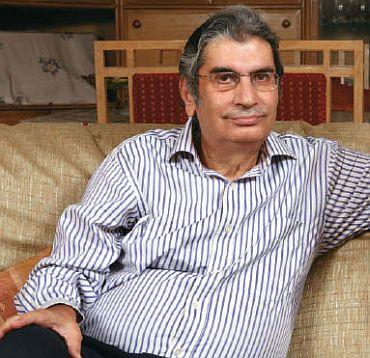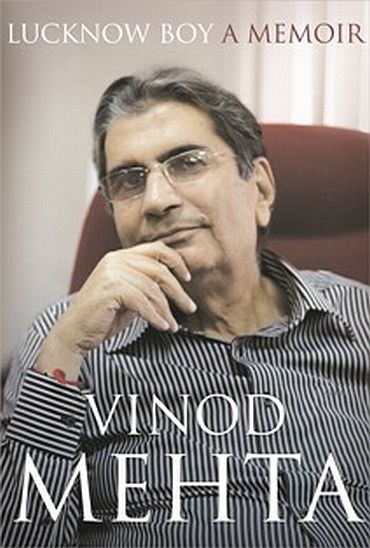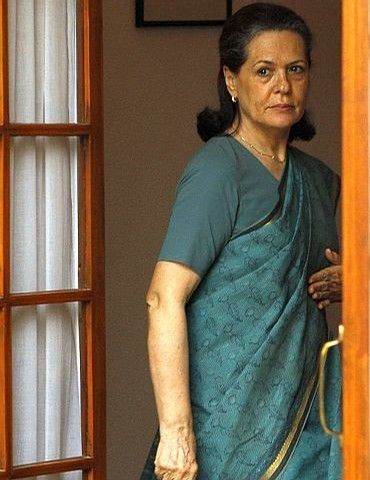 | « Back to article | Print this article |
'Politician-journalist bonhomie bad for democracy'
Eminent journalist and editor-in-chief of Outlook, Vinod Mehta, released his much awaited memoirs Lucknow Boy, and was at his usual wittiest at the launch in New Delhi on Wednesday, reports Priyanka.
In conversation with popular TV journalist Arnab Goswami, he candidly outpoured happenings he has gone through in a journalistic career of about four decades.
Actor and political commentator Suhel Seth read out a few extracts from the autobiography, much to the amusement of the creme de la creme of editors, diplomats and bureaucrats and other dignitaries present on the occasion.
Mehta frankly admitted that he never had a great education to back him up, and said, ".. I am literally uneducated. The two years I spent at the Lucknow University were distinguished by not learning anything, and whatever I had learnt I had forgotten in those two years."
"I have been on the road for forty years. Whatever I have learnt about journalism or design is through educating myself, and now I wanted to share it all," he added.
Please click NEXT to read further...
'I do have a great nose for frauds'
Lucknow Boy would be laying in open the insight of Mehta on the many ups and downs and controversies he has borne witness to in the past forty years or so. On being asked if he believed journalists and politicians could become true friends, Mehta answered rather uprightly, "First, we have to interact all the time, and hence I am not suggesting that we become enemies. But obviously, we can't become friends in the E M Forster sense, and say that I would rather betray my country than my friend."
"Journalists and politicians follow two very different vocations."
"Politicians are in a line of embellishment, spin and sometime the business of telling lies. We on the other hands, despite all our faults and imperfections, are in the business of getting to the truth and in trying to arrive at an independent version of what things are like."
If there is some tension between the two, it is healthy for the democracy. But if they become too cozy, it's rather bad for a democracy," he added.
Mehta then talked about the Radia tapes and how it had brought about disturbing aspects of journalism in the open. "Many of my colleagues caught on the Radia tapes later claimed they were stringing her along to get out information. But many people would rather believe that Radia would be an idiot if she would allow herself to be strung along, without knowing fully what was happening," Mehta said amusingly.
"Yes, we all need to develop sources, but we should be able to say no."
Mehta further narrated the incident when he had first come face to face with Niira Radia. "I was in my office and just as I saw Radia, I thought, 'Oh my god, here comes calamity Jane.' We formally exchanged cards and that's it."
"Luckily in that way, I didn't string her for any information and she didn't ask any information from me," Mehta added. He cited his brief encounter with Radia and claimed that he exited because he could always spot frauds.
On being further probed by Goswami, especially on how he was able to 'smell' the news of match fixing in international cricket, Mehta sportingly admitted, "I can't claim that it was my idea, and I can't pretend I have a great nose for stories. But I do have a great nose for frauds."
'Many people think I am a great chamcha of Sonia Gandhi'
On the difficulties of being a journalist, Mehta openly admitted that asking for favors from politicians and bureaucrats was perhaps the single biggest pain point of his journalistic life.
It brought back memories when the Outlook group was raided in 2001 and Mehta recalled, "Brajesh Mishra (former foreign secretary) and (former PM) Atal Bihari Vajpayee had raided the Outlook offices and I went to meet Mishra. I informed him about the raid, and he, though fully aware as he was the mastermind behind the raid, acted as if he was most utterly surprised and astounded. Saying that he and Vajpayee were great believers of free press, he called (then finance minister) Yashwant Sinha and asked me to see him."
"Within the next 24 hours the raids stopped. And since then, every time I meet him, he does not fail to remind me of the favour he had done. I have written about it in the book. It was the most humiliating experience of my life."
He further clarified, "Many people think I am a great chamcha of Sonia Gandhi. But the only thing I have ever asked from her is to be the chief guest at Outlook's ten anniversary party."
On being asked, what would he consider that one story he wished he had not done, Mehta first reaction was, "Oh my God." But he soon added on, "It was during my tenure at the Times of India in 1971. The story was about finding out who is the Central Intelligence Agency mole in Indira's Gandhi's cabinet. The only document I had got hold of was a letter written by RAW to the then Prime Minister Rajiv Gandhi, saying that it was not Moraji Desai."
"I published my story on this single piece of evidence. I knew that I had made a mistake to the extent that I didn't have any great evidence though I did have the letter written by RAW. Bombay was soon burning and they threatened to burn down TOI office."
"I did a half baked story. I had to resign from my job after being in TOI for 29 days. I wish I had not done the story but after I had done it, I felt I should pay the price of not being able to provide the evidence so I resigned from the job."
For more on the incident, and what happened before and after, and on other controversies encompassing Mehta, on his spat with Shobha De, one will have to read the Lucknow Boy.


